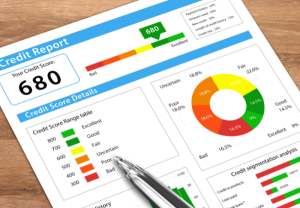A credit score is a three-digit number that rates an individual’s creditworthiness. It provides lenders with an assessment of the borrower’s ability to repay debts and manage credit responsibly. A higher credit score indicates better creditworthiness, making it easier to secure loans and obtain favorable interest rates.
Various factors influence an individual’s credit score, including:
- Credit History: The length and quality of credit history impacts the credit score. Factors such as the number of accounts, total debt levels, and repayment history are considered.
- Credit Utilization: This refers to the amount of available credit that an individual is using. High credit utilization may negatively affect the credit score.
- Payment History: Timely payments reflect positively on the credit score, while late payments can have a detrimental impact.
- New Credit: Opening multiple new credit accounts within a short period may raise concerns about financial stability.
- Credit Mix: Maintaining a diverse mix of credit, including both installment loans and revolving credit, can positively impact the credit score.
The credit bureaus, such as Equifax, Experian, and TransUnion, collect and analyze consumer credit information to calculate credit scores. Lenders rely on these scores to evaluate an individual’s creditworthiness and make informed decisions regarding loan approvals and interest rates.
Key Takeaways:
- Credit scores determine an individual’s creditworthiness, affecting loan approvals and interest rates.
- FICO scores range from 300 to 850, with higher scores indicating better creditworthiness.
- Credit history, credit utilization, payment history, new credit, and credit mix are key factors influencing credit scores.
- Monitoring credit reports, maintaining on-time payments, and managing credit responsibly can lead to an improved credit score.
- Understanding credit score factors empowers individuals to take control of their financial profile.
How Credit Scores Work
Credit scores play a vital role in an individual’s financial life, influencing their ability to access credit and secure favorable interest rates. Understanding how credit scores work is essential for making informed financial decisions and improving one’s creditworthiness.
Having a higher credit score can significantly impact an individual’s financial well-being. Lenders are more likely to approve loan applications from those with higher credit scores, as it indicates a lower risk of default. Not only does this increase the chances of loan approvals, but it also opens doors to better interest rates.
Good credit scores can result in lower interest rates, ultimately leading to long-term savings for borrowers.
The credit score ranges for categorization vary slightly depending on the credit bureau, but generally, they fall into the following categories: excellent, very good, good, fair, and poor. A higher credit score places an individual in a more favorable category, positioning them for better financial opportunities.
Credit scores are not limited to loan applications. They also influence decisions made by employers, service providers, and utility companies. For example, a good credit score can increase the chances of being hired for a job that involves handling finances or obtaining rental agreements with more favorable terms.
“A good credit score is not only beneficial for loan approvals and interest rates but also opens doors to better job opportunities and favorable rental agreements.”
Understanding how credit scores work empowers individuals to take control of their financial profile and make strategic decisions to improve their creditworthiness. By maintaining a higher credit score, individuals can enjoy the benefits of better interest rates, increased loan approvals, and improved financial opportunities. A holistic approach to managing credit can lead to a more secure financial future.
| Benefits of Higher Credit Scores | Impact on Financial Life |
|---|---|
| 1. Increased loan approvals | 1. Better interest rates |
| 2. Access to higher credit limits | 2. Favorable rental agreements |
| 3. Better chances of employment | 3. Access to preferred service providers |
| 4. Improved financial opportunities | 4. Lower security deposits |
Factors Affecting Credit Scores
Several factors play a crucial role in determining an individual’s credit scores. Understanding these factors can help you take control of your credit profile and work towards improving your creditworthiness.
1. Payment History
Payment history is one of the most important factors influencing credit scores. It reflects an individual’s track record of making timely payments on their credit obligations. On-time payments contribute positively to the credit score, while late payments can have a negative impact.
2. Credit Utilization
Credit utilization refers to the ratio of credit used compared to the total available credit. It is recommended to keep your credit utilization below 30% to maintain a good credit score. High credit utilization can indicate a higher risk of default and may lower your credit score.
3. Length of Credit History
The length of your credit history also affects your credit scores. Generally, longer credit histories are considered less risky as they provide a broader perspective on an individual’s credit management habits. It is important to establish and maintain a positive credit history over time to improve your creditworthiness.
4. Credit Mix
Credit mix refers to the different types of credit accounts an individual holds. Having a diverse mix of credit accounts, such as credit cards, loans, and mortgages, can demonstrate your ability to handle various types of credit responsibly. A well-managed credit mix can positively impact your credit scores.
5. New Credit
Opening multiple new credit accounts within a short period can negatively affect your credit scores. It suggests a potential increase in credit risk and may be interpreted as a sign of financial distress or desperation for credit. It is advisable to be cautious when applying for new credit.
While these factors play a significant role in determining credit scores, other factors like total balances and overall debt are considered as well, though to a lesser extent.
| Factors | Impact on Credit Scores |
|---|---|
| Payment History | Significant; on-time payments boost scores, while late payments have a negative impact. |
| Credit Utilization | Important; lower utilization rate improves scores, while high utilization can lower them. |
| Length of Credit History | Important; longer credit histories are considered less risky. |
| Credit Mix | Important; diverse mix demonstrates the ability to handle different types of credit. |
| New Credit | Important; multiple new credit applications can negatively impact scores. |
Conclusion
Credit scores are a fundamental aspect of an individual’s financial life and present a multitude of opportunities. To improve credit scores, it is crucial to maintain on-time payments and keep credit utilization low. It is also important to consider additional factors such as credit history length, credit mix, and new credit applications. By monitoring credit reports for errors and collaborating with credit repair companies, individuals can proactively manage and enhance their credit profiles.
Good credit scores provide access to loan approvals with favorable terms, fostering potential savings in the long run. Understanding the factors that impact creditworthiness empowers individuals to take control of their financial health. By implementing positive credit habits and staying informed about credit score factors, individuals can navigate their financial journeys with confidence and make informed decisions.
Remember that credit scores are not fixed and can be improved over time through disciplined financial practices. By prioritizing responsible credit management, individuals can pave the way for a more prosperous financial future.



